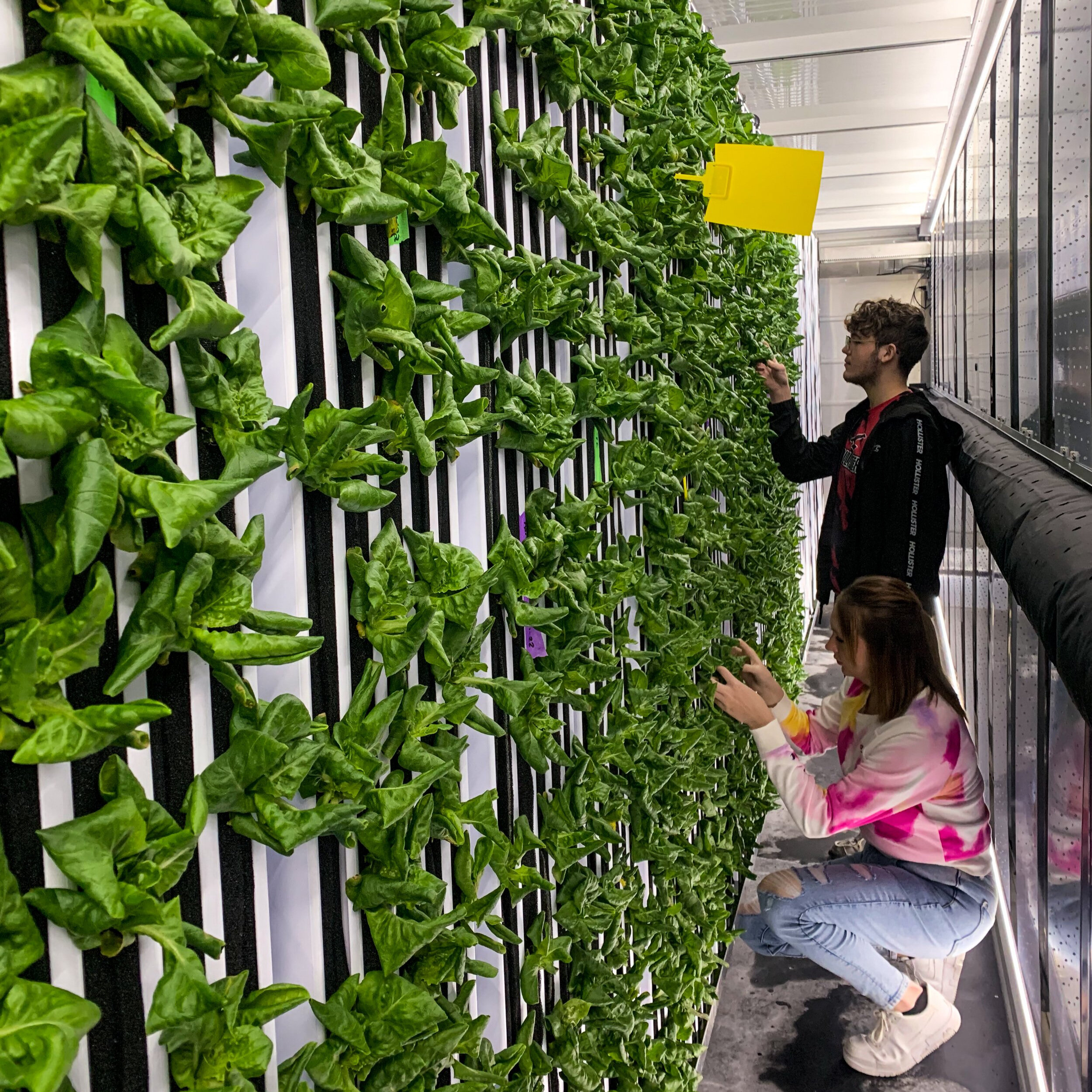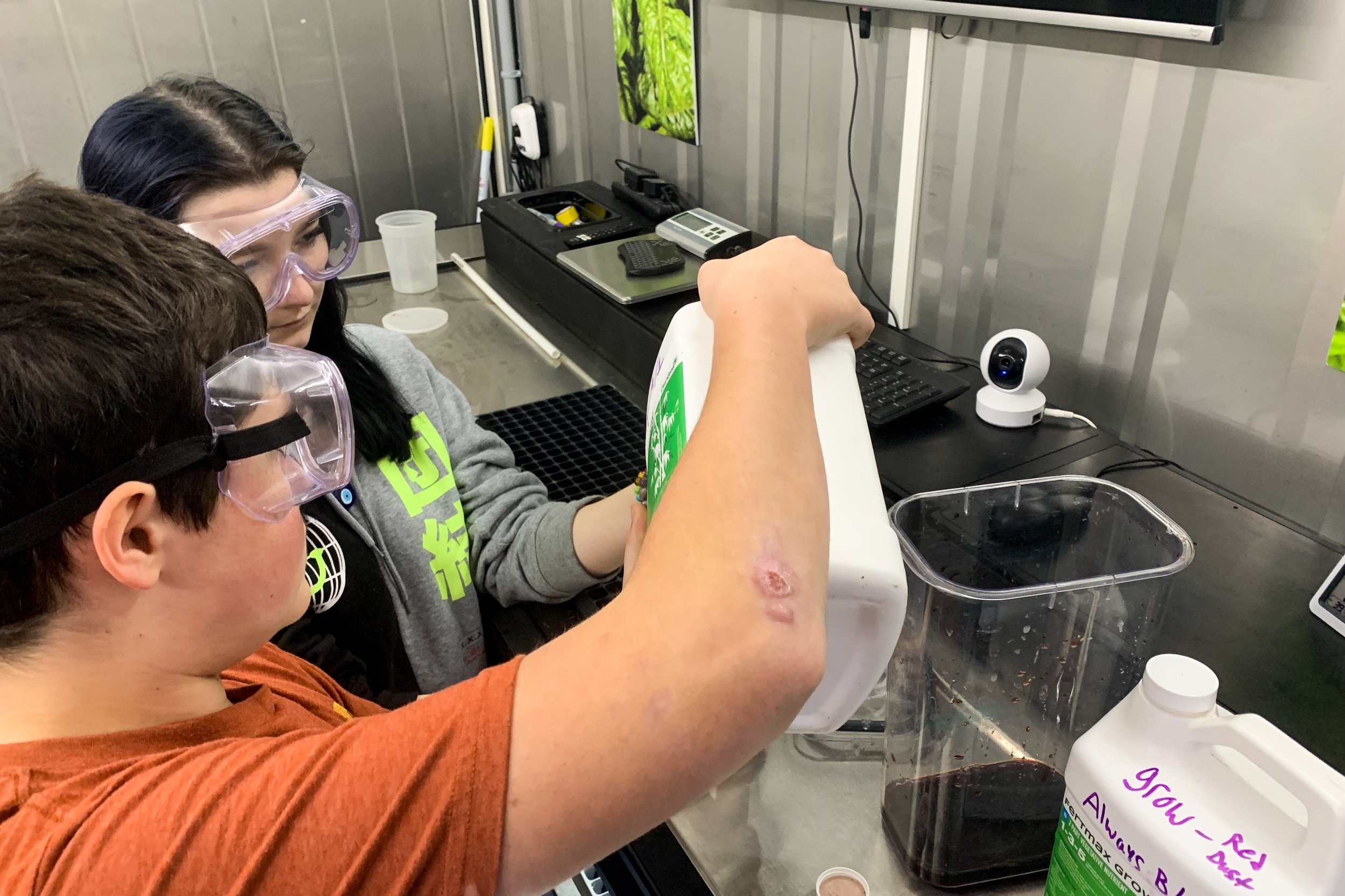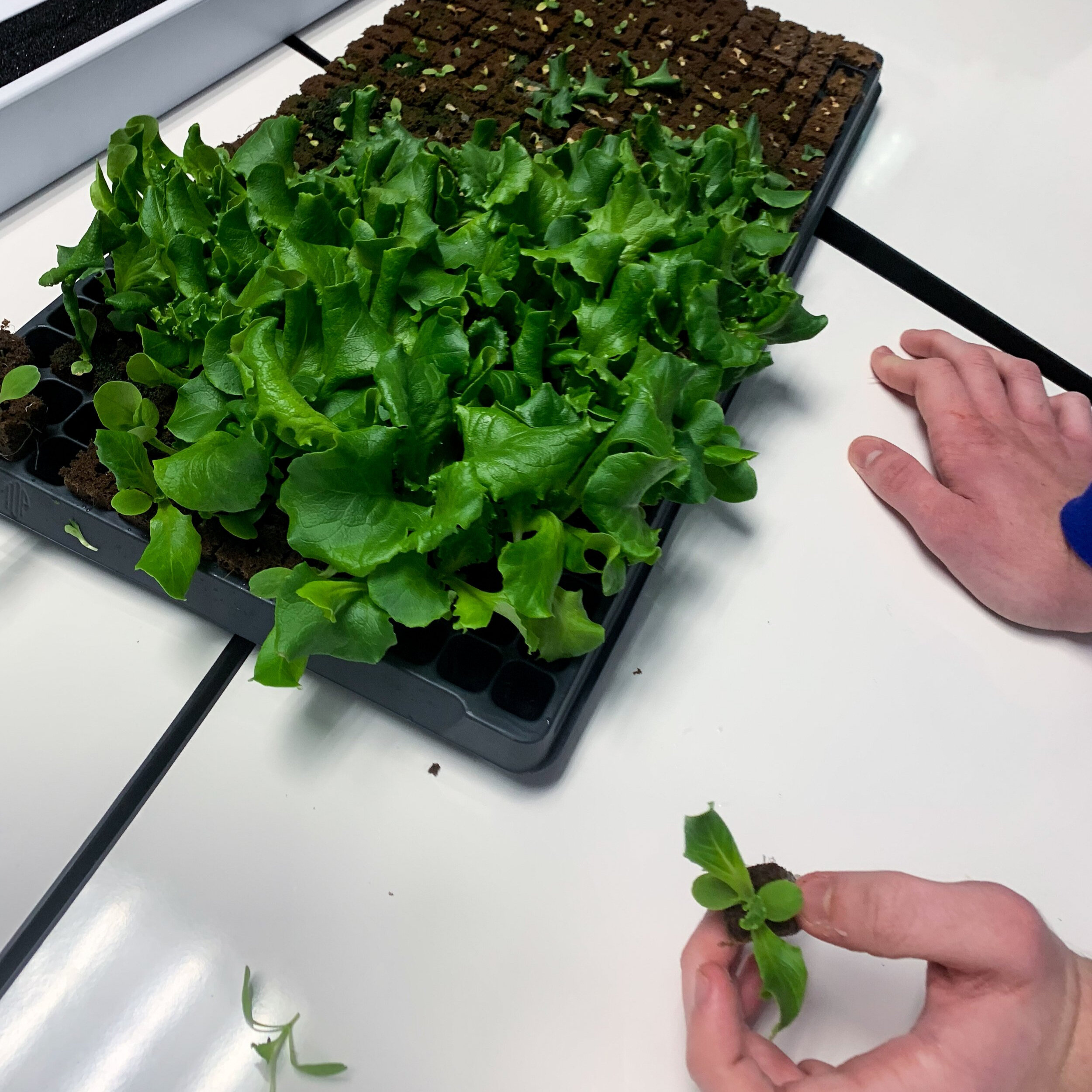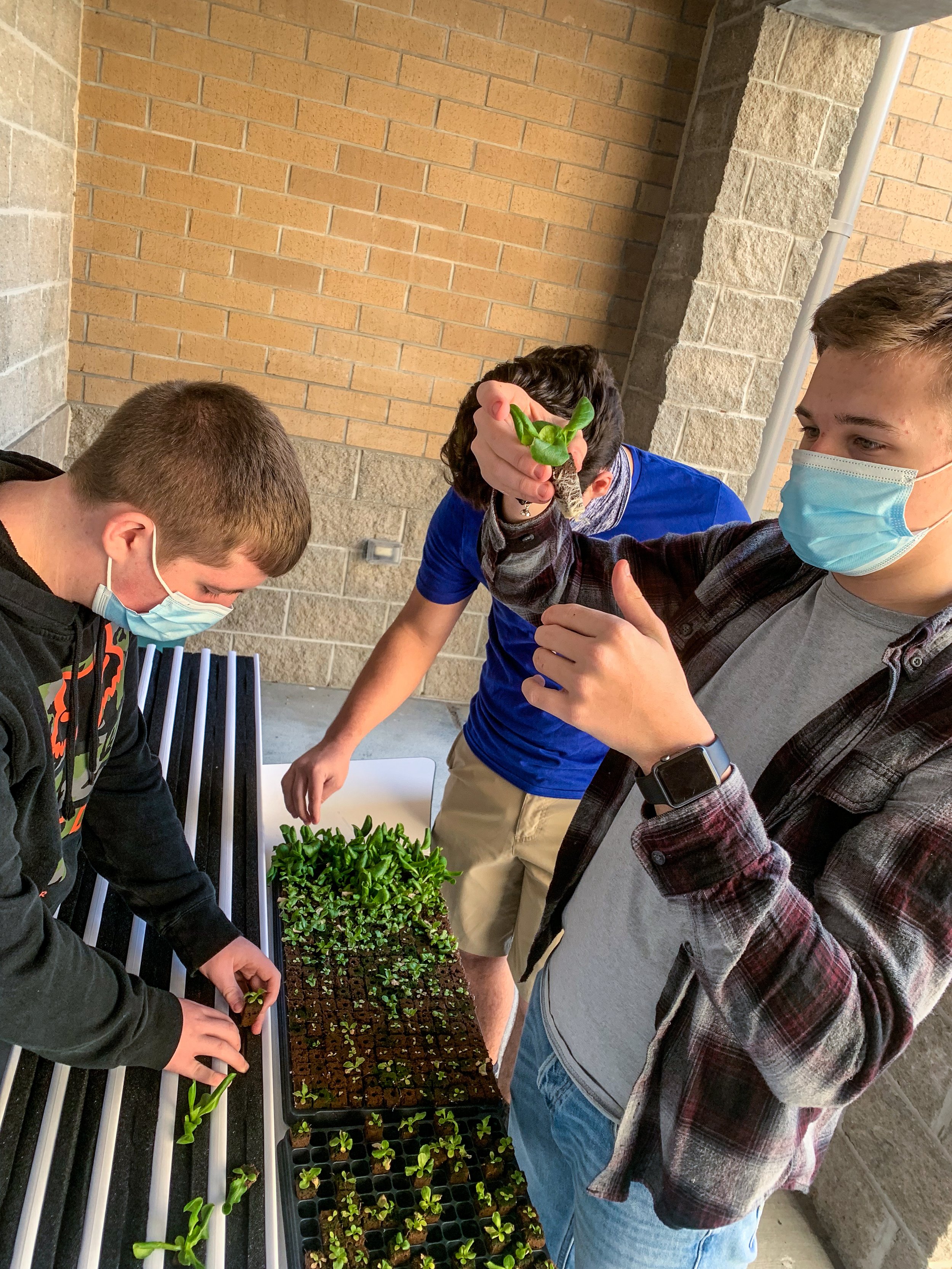Lessons on the parts of seeds, plants, and flowers and their functions and on plant reproduction are intermixed with students being tasked with identifying careers around plant science.
 A School Uses a Freight Farm for FFA Programming and Agriculture Education
A School Uses a Freight Farm for FFA Programming and Agriculture Education

Case Study from | Freight Farms
In Kentucky, Floyd County School of Innovation (FCSI) has launched an FFA program hinged on a Freight Farm.
FCSI is a new school, born of a desire to give kids the opportunity to take control of their educational future by offering STEM pathways and career and technical education. The school operates on a unique opt-in, part-time model in which students from the surrounding schools can choose to apply to FCSI and then get bussed to the school for a few hours each day. The school opened its doors in 2020 to 80 students taught by three teachers. Now in its third year, FCSI has increased its staff to seven teachers and serves 200 students.

— Payton Hansford, FCSI FFA Reporter

The Need for an Agriculture Program
Soon after FCSI launched, administration realized that Floyd County was one of only five counties in Kentucky to not offer an agriculture program. This felt like a gap, especially given the agricultural nature of Kentucky and the school’s focus on career pathways. FFA (which stands for Future Farmers of America) is a program that prepares students for leadership and careers in agriculture — including science, business, and technology — through hands-on experiences. Unfortunately, however, land surrounding the school was too limited to start a traditional farm or build a greenhouse for those all-important, real-world agriculture experiences that are the foundation of an FFA program.
So, FCSI administration and the school board got in touch with a local company that has helped connect FFA programs in Kentucky with indoor farming technology. Through this connection, FCSI found out about Freight Farms. They applied for grant funding for a container farm, which was delivered to the school in November 2021.
“The container farm at Floyd County School of Innovation has provided opportunities for the students of rural Eastern Kentucky that they would have never been provided.”

Justin Smith, FCSI Agriculture Teacher and FFA Advisor
FFA Agriculture Curriculum
The Freight Farm quickly proved to be an asset to the school, drawing students to both FCSI and the agriculture program and offering another FFA pathway. (Many students participating in FFA pursue animal studies, but the Freight Farm opened up the world of plant science to the school.)
Leading the program is agriculture teacher Justin Smith. Originally from the neighboring Johnson County, where he was a state officer for FFA, Justin graduated from the University of Kentucky with a degree in agriculture education and joined FCSI staff to launch the school’s agriculture program.

Justin has built an FFA and agriculture curriculum around the Freight Farm by combining an iCEV plant science certification curriculum and his own plant science education. Inside the school container farm, he teaches a greenhouse class that covers plant science concepts like pH and EC. It’s easy to make these concepts hands-on in the Freight Farm, where students can gain the concrete experience of, for example, seeing nutrient deficiencies on plants’ leaves when EC is out of balance. While learning such ideas, students also help Justin run the farm by planting, transplanting, harvesting, preparing lettuce for sale, and performing some farm maintenance. Plant science in a classroom setting can be boring; in the container farm, it’s hands-on and interesting.
The Freight Farm is the foundation of a well-rounded agriculture program that hits the pillars of FFA. Lessons on the parts of seeds, plants, and flowers and their functions and on plant reproduction are intermixed with students being tasked with identifying careers around plant science, making a plan for a pollinator garden, and creating a farm business plan that includes a growing guide and marketing plan.
“Our agriculture students have benefited greatly from the container farm. Being in an area with limited space for a greenhouse or garden, the container farm provides a place for students to build upon the foundations we set inside the classroom. Getting to see my students demonstrating their knowledge in the farm makes me one proud agriculture teacher.”

From School Container Farm to the Community
Although Justin’s agriculture classes experiment with nontraditional container farm crops like carrots and scallions, they focus on lettuce. Getting the lettuce to consumers is a grassroots effort. Justin emails the cafeterias in schools across the county to let them know how much produce is available, and FCSI helps to transport it to the schools that purchase it. Community partners like the local hospital and local restaurants also buy their lettuce. Any remaining produce, he offers up to the community via Facebook.
The revenue from these sales is reinvested into FCSI’s FFA program. It’s used to help purchase supplies for the hydroponic farm and pay for FFA initiatives like conference and camp attendance fees. Additional grants help to support the farm program and FFA at FCSI. The school’s goal is to eventually work toward a self-sustaining Freight Farming program.
The Freight Farm’s School Impact
From increased enrollment to connection to community, the Freight Farm has offered quantitative and qualitative benefits beyond lettuce and lessons. Before the Freight Farm, students didn’t know what plant science involved. With the addition of the Freight Farm, more students enrolled in the agriculture program and FFA. Christina Crase, FSCI principal, has also seen more community involvement at the school since bringing a Freight Farm to campus — the vertical farm is a conversation piece that people want to be involved in!
“Students who are active in FFA and our Agriculture pathway enjoy their time in the container farm and are learning many critical skills throughout their course work. But I believe the biggest impact of the container farm is the community involvement and pride that it is bringing to our area. Students are proud to harvest their crops and sale to our community. We have individuals and community partners asking to purchase crops each week. This involvement and excitement has been really powerful to witness.”
— Christina Crase, FCSI Principal
The content & opinions in this article are the author’s and do not necessarily represent the views of AgriTechTomorrow
Comments (0)
This post does not have any comments. Be the first to leave a comment below.
Featured Product




